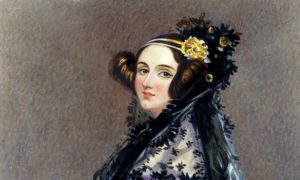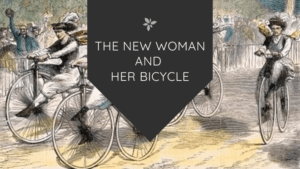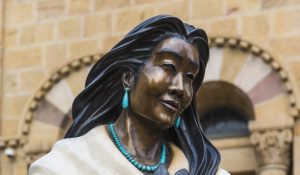Queen Nzinga Mbande was a ruthless and powerful 17th century African ruler of the Ndongo and Matamba Kingdoms (modern-day Angola). Nzinga fearlessly and cleverly fought for the freedom and stature of her kingdoms against the Portuguese, who were colonizing the area at the time.
Around the turn of the 17th century, the independent kingdoms and states of the Central African coast were threatened by Portuguese attempts to colonize Luanda. (Luanda, today the capital of Angola, was founded in 1576.) Portugal sought to colonize the region in order to control the trade in African slaves, and attacked many of their old trading partners to further this goal.
Unlike many other rulers at the time, Nzinga was able to adapt to these changing circumstances and fluctuations in power around her. By her own determination and refusal to give in to the Portuguese without a fight, she transformed her kingdom into a formidable commercial state on equal footing with the Portuguese colonies.
See Also: Sayyida al Hurra, Islamic pirate queen
In 1617 the new governor of Luanda began an aggressive campaign against the kingdom of Ndongo. His troops invaded the capital and forced King Ngola Mbandi (Nzinga’s brother) to flee from the area. Thousands of Ndongo people were taken prisoner.
The king sent his sister Nzinga Mbandi to negotiate a peace treaty in 1621, which she did successfully. But Portugal didn’t honor the terms of the treaty, and King Ngola Mbandi committed suicide, leaving the kingdom to his sister Nzinga. (Other accounts claim Nzinga poisoned her brother, or murdered her brother’s son the heir after Ngola committed suicide, in order to seize power.)
As the new sovereign of Ndongo, Nzinga re-entered negotiations with the Portuguese. At the time, Ndongo was under attack from both the Portuguese and neighboring African aggressors. Nzinga realized that in order to achieve peace and for her kingdom to remain viable, she needed to become an intermediary. She allied Ndongo with Portugal, and was baptised as Ana de Sousa Nzinga Mbande with the Portuguese colonial governor serving as her godfather. By doing this she acquired a partner in her fight against her African enemies, and ending Portuguese slave raiding in the kingdom.
The new alliance didn’t last very long, however. Portugal betrayed Ndongo in 1626, and Nzinga was forced to flee when war broke out. Nzinga took over as ruler of the nearby kingdom of Matamba, capturing Queen Mwongo Matamba and routing her army. Nzinga then made Matamba her capital, joining it to the Kingdom of Ndongo.
To build up her kingdom’s martial power, Nzinga offered sanctuary to runaway slaves and Portuguese-trained African soldiers. She stirred up rebellion among the people still left in Ndongo, now ruled by the Portuguese. Nzinga also reached out to the Dutch and invited them to join troops with her. She told the Dutch she would be happy to ally with them because of their justice and politeness, whereas the Portuguese were proud and haughty.
Even their combined forces were not enough to drive the Portuguese out, however, and after retreating to Matamba again, Nzinga started to focus on developing Matamba as a trading power and the gateway to the Central African interior.
By the time of Nzinga’s death in 1661 at the age of 81, Matamba was on equal footing with the Portuguese colony. The Portuguese came to respect Queen Nzinga for her shrewdness and intransigence.
With Nzinga’s rule, Matamba became a powerful kingdom that long resisted Portuguese colonisation attempts and was only integrated into Angola in the late nineteenth century.
Image of Nzinga Mbande courtesy Wikimedia Commons.
Recommended Reading
Keri is a blogger and digital marketing professional who founded Amazing Women In History in 2011.






Excellent article as always. I referenced this post on the SSS facebook page today. I’m posting about queens and rulers this week for Women’s History Month and am looking for those we may not know. Nzingha was perfect! Thanks for your excellent web site!
Thanks so much!
It’s so cool to imagine all of this really happening, thank you so much for the article! Nzinga sounds like such a fierce warrior queen and I find that so awesome.
In fact no matter if someone doesn’t understand then its up to other people that they will assist, so here it occurs.
Feel free to surf to my blog: air conditioning las vegas
A TWISTED-BIAS HISTORY OF A GREAT QUEEN AND PEOPLE. AFRICANS MUST RE-WRITE OUR TRUE HISTORY.
Lawrence Aziz Brown, it’s not enough to just say “a twisted-bias history”, you have to explain what is and why, otherwise nobody’s learning anything. If the story shared above is not accurate, I’d love to hear the real one.
Why no mention of her kidnapping and selling slaves to the Portuguese? This is what she is known for.
Hi Holly ~ I didn’t come across any mention of anything like that in my research. Do you have a source you can point me to? Thanks.
Although I offer no reference, I watched a program on TV where they said she sold slaves and other prisoners to the Portuguese until they wanted more, and then went after her people…including the two princesses.
the program to which he is referring is “mankind: the story of all of us” on the H2 channel. i’m watching it right now. according to them, she had a lucrative partnership going with the portugese selling people from the neighboring tribes to them as slaves. apparently, these people she preyed upon struck a deal with the portugese to launch a combined attack which toppled her from power and enslaved her people. if so, it sounds more like poetic justice than some courageous stand for freedom.
Hi Holly, I have been working on my ancestry and find that she is my 10th great grandmother. I was quite shocked. I am trying to confirm this and am interested in finding out more about her. Can you suggest the best direction for me to take that will help me learn more about her. Thanks.
I’ve heard the same thing about her selling slaves to the Portuguese. I do know that she had relations with a white man from Spain/Portugal or southern France whose last name was Monsingaux. I do know that this relationship had a son, who ended up in the Virginia Colony, and from these two persons, came forth a family with the last name of Mozingo – and there is a black line and a white line that is found in parts of Virginia, NC and SC. If I recall right, Dona Ana is my 15th great grandmother, and there is another man in town who has the Mozingo last name. The doctor and I are part of the white lineage.
@KeriLynn Engel I just finished writing a short biography of Nzinga for a World Civilization class as she does appear in my textbook and I found her story particularly interesting. If you’d like to read about some of the more negative aspects of this queen, I’d suggest reading “Nzinga of Matamba in a New Perspective” by Joseph C. Miller, an article that appeared in the Journal of African History, XVI 2 (1975), pp. 201-216. It also goes into how she had to overcome the political and social norms of west-central Africa to claim the throne.
By any chance, did her converting to Catholicism affect her selling of slaves>
One of the best attributes we can have is being fearless. Fearless to get out from our comfort zone. Enjoy outdoor and have some fun. Try this new fake sonogram videos from fake ababy. This is amazing. It gives you more chances to laugh a lot.
Queen Nzinga Mbande was a military strategist and powerful 17th century African ruler of the Ndongo and Matamba Kingdoms. I can’t believe that I wasn’t taught about her while in high school or in college. We need more women like her, today!! Nonetheless, she’s featured in my new book, “7 Types of Queens, Kings Desire.” http://www.7queens7kings.com
I would recommend that all with negative comments and those who want to get a non biased view to get and read the book The Destruction of Black Civilization by Chancellor Williams. He spent 18 years traveling across the continent to do his research. I would not trust the Portuguese or any white person for that matter to report an accurate unbiased story. History is jam packed with lies, cover-ups and deception from that perspective. There’s much to hide and cover up and much truth to be revealed.
Thank you for the recommendation. Here’s the book for anyone else who’s interested: http://amazon.com/Destruction-Black-Civilization-Great-Issues/dp/0883780305
And who do you think that wrote and preserved the memory of this woman in the first place?
These accounts, come from the “Tower of the Tomb”, our national archives, and possibly to some extent the Dutch archives.
Sorry, but a lot of this information is incorrect, first she was defeated and even converted to Christianism by the name Dona Anna de Sousa.
Done on her own accord looking for a truce with the Portuguese, hence the name “Anna”.
Second, she was in fact a pawn between Dutch and Portuguese politics at the time and a despot to her own people.
She sided with the Dutch at her convenience, but not necessarily because of her brilliantism as you put it.
African tribes have been warring each other for centuries, she had far more enemies than just Europeans.
This cohesive unity you see in Angola nowadays is due only to the colonialism period.
I apologize in advance if this ruins someones day, but I’m far more concerned with historical acuity than with petty political escapades.